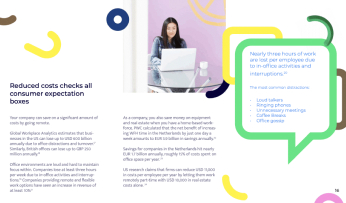When the pandemic started—panic aside—introverts worldwide rejoiced. They could finally work from home (WFH) alone. But, after a while, even the most solitary experienced feelings of isolation.
With fewer opportunities for social meetups and the enforced solitude of a home office, a global mental health crisis has accelerated worldwide.
According to recent research by Cigna, loneliness is at an all-time high.
Meanwhile, Harvard researchers found over a third of American adults reported loneliness during the pandemic, with 61% of young people feeling it the most.
With a loneliness epidemic linked to pandemic safety measures, even experts don’t quite know how to fix it. And as much as we champion remote work, there’s only so much Zoom can do.
It’s scientific
As Microsoft CEO Satya Nadella said best: “Digital technology should not be a substitute for human connection.”
While we believe the pros of working from home far outweigh the cons, three in ten Americans consider quitting their jobs if they can’t work remotely. And sure, these statistics are US-based, but the rest of the world is just as fatigued.
Loneliness isn’t just a feeling. Isolation can wreak havoc on physical, mental, and cognitive health.
In research before the Covid-19 pandemic, organisational psychologist Lynn Holdsworth found that full-time remote work increased loneliness by 67%.
With that in mind—and the roughly 3.39 billion people working from home—that’s a lot of lonely people.
In 2020, internet firms Buffer and AngelList reported that loneliness is still the biggest struggle for remote employees. Research also suggests that it drives burnout and churn.
So, where to begin fixing this? Well, it comes down to you (and a little help from your friend, Cocoroco).
How to tackle WFH loneliness
We’ve all felt lonely from time to time. Even Elon Musk occasionally feels lonely swimming in his pools of cash. If the figures are anything to go by, it’s the norm. But it doesn’t have to be.
If you still work remotely, the good news is that we’re closer to being out of the covid woods. There are way more loneliness-fighting options available now than there were a year ago, like:
1. Make plans
You might prefer sitting at home instead of commuting, but changing things won’t hurt. Going out with friends now and again can help you enjoy being at home even more. With a good work-life balance, socialising actually enables you to be more productive on workdays.
🎨 Make plans to see people, go places, and do things—human interaction matters. Video calls aren’t the same as meeting your best friend face-to-face; they can’t replace the endorphin rush from breathing fresh air. Remember: your online community, computer, and Netflix will still be there when you return.
2. Reach out
It’s too easy to cut yourself off when working from home. You might not even realise you’ve done it—even when around your family—until it’s too late.
It’s important to keep reaching out. Humans thrive when our sense of belonging is reinforced through healthy social connections and being amongst like-minded people.
🧑🤝🧑 Reach out to friends, family, and even your remote team members. It’s what they’re there for.
3. Exercise
Exercise is a great way to get yourself back out there. And who knows who you might bump into at the dog park, health food shop, or gym.
Research by Cedars-Sinai found group exercise classes decreased loneliness and improved feelings of social connectedness for all surveyed, even after adjusting for age, gender, and other markers.
🚴 Take walks, join a gym, or join a fitness class. You’ll meet people, get fresh air, feel great, and appreciate your own company even more.
4. Coworking space
Coworking spaces have boomed over the last few years. Even your neighbourhood coffee shop may have seen a meteoric rise in stature as a comfortable work environment.
Although the pandemic threw a wrench in the works, trends suggest coworking spaces are due for a big comeback with increased social interactions and perks.
🧑💼 If you’re hungry for coworkers and watercooler chats, check out a local library, coffee shop, or professional coworking space. They’re popping up in rural areas, too.
5. Get a pet
Pets make people feel less lonely. Whether you’re a dog person, a cat person, or a lizard person, a four—or even eight—legged friend could be just what the doctor ordered.*
So what if your tortoise isn’t a great jogging partner or your hamster’s karaoke skills are questionable? Being a pet parent has many physical, emotional, and mental benefits. Forbes reports pet owners are 36% less likely than non-pet owners to report feeling lonely overall.
🐶 Adopt an animal companion. As well as being great company, some animals give you a reason to get out of the house and even end up meeting other people.
* Please only consider this option if you have the bandwidth to be a pet parent. If you can’t commit full time, offer to walk the neighbours’ dog.
6. Connect online
Reddit. Forums. Discord. Social media; the internet is vast. The internet is vast. You can find people who like the same things as you easily. These connections can sometimes even lead to long-lasting friendships.
For even more impactful conversations, check out apps like TalkLife that offer you a safe space to talk about anything—from heartbreak to mental health—and receive empathetic peer support anytime and anywhere.
In a virtual world, smart apps can help you with almost anything. Technology’s biggest social advantage is how easily it connects people who might otherwise find it difficult to visit places, events, or communities in person.
🎮 Join an online forum for people who share your interests, and find safe spaces for support. When the weather outside is lousy, and you’re locked in feeling blue – a meaningful online conversation still has the power to brighten your day.
7. Chat to coworkers
The best kind of coworker is one you can talk to. Even if office chit-chat is something you’re glad to be free of, you might be surprised how much fun you can have with your team members.
🧨️ Talk to your colleagues about non-work things. Just watched a new movie? Ask if anyone else has seen it. Hooked on a new video game? Perhaps one of your workmates also shares your obsession. Remember: there’s more to work than work.
8. Meditate
Many studies have found strong links between meditation and decreased feelings of loneliness. If you’re unsure where to begin, the Loving-Kindness meditation increases your sense of social connectedness. It helps you develop a caring attitude towards yourself and others around you.
Meditation can work wonders. Billionaires like Jack Dorsey, Bill Gates, and the late Steve Jobs have publicly shared their personal meditation routines and exercises.
🙏🏼 Pick a meditation practice that works for you and be regular with it. Online apps like Headspace and Waking Up offer a range of different modules to choose from, both free and paid.
- Practice kindness
Researchers from Harvard have proved a feedback loop between kindness and happiness: one encourages the other. Moreover, the findings show that doing good deeds does make people feel good.
Acts of kindness towards others help you develop deeper feelings of care and connectedness with people around you, increasing your overall satisfaction with life.
🤝🏼🤗 Mindfully practice daily acts of kindness to feel less lonely. Try doing three or five kind things every day, whether big or small: from helping an older person cross the road to assembling your friend’s furniture delivery. You’ll be surprised by how much doing good feels good, too.
10. Seek out nature
A walk in the woods is nature’s care-recipe to combat loneliness and other human sorrows, even if you’re walking alone. Research shows that being in nature increases feelings of connectedness, serenity, and bliss.
🌳🌷Take a moment every day to admire the beauty around you. From watching a sunset to sitting under a tree, soak in the spectacle of the natural world with mindfulness. Know you’re a part of a larger whole, tune into the vastness of the universe, and savour a moment of inner peace.
11. Skip the small talk
Most of us tend to make polite conversation by default. But you might long for more meaningful conversations with people you care about. Pop star news won’t make you feel more connected to your friends or partner like a good heart-to-heart can. So don’t shy away from that.
😊💬 If you need some help starting more open and honest conversations, try the Fast Friends technique. Ask a colleague, friend, family member, or partner to participate in this exercise in self-disclosure. It can dramatically increase closeness and connection, helping you form stronger and healthier relationships.
12. Talk to strangers
In a surprising twist to the adage ‘don’t talk to strangers,’ modern research shows most of us feel happier talking with people we’ve never met before. So your instinct to put your best face on before someone new also effectively boosts your positivity and mood.
The New York Times reports introverts and extroverts were happier when they had greater social interactions with strangers.
📵🚝 Put the phone away on public transport and talk to someone seated beside you. Even chatting with your bank teller, grocer, or taxi driver may give you the dopamine boost you need when you least expect it.
13. Volunteer
The key is in your hands if you want to unlock yourself from the loneliness trap. Shifting your focus from yourself to others is a great way to do it. In a recent UK study, every 2 out of 3 people reported feeling less isolated after volunteer work.
🙌🏼 Find a cause you believe in and dedicate some time in your week to it to combat loneliness. The best part about volunteering for a social cause is you’ll meet people who care about the same things you do while helping to make the world a better place.
14. Be wary of social media
There’s increasing evidence linking social media usage with depression. Sun-drenched holiday pictures from influencer accounts might feel good in the short term, but yearning for an aspirational lifestyle you can’t afford can contribute to deteriorating mental health.
👩🏻💻 Use social media to make new friends and reach out to existing ones. Avoid mindless doom scrolling through feeds you might get sucked into because of sneaky algorithms.
15. Admit your feelings
If you’re feeling lonely, ditch the shame in admitting it. It doesn’t mean there’s anything wrong with you, and being ashamed only makes you feel worse. Loneliness is a simple biological response to isolation. After all, you can’t experience well-being if you don’t feel connected and secure.
Feeling lonely is as natural as hunger and thirst without food or water.
💙 While there’s no way to ‘switch off’ loneliness, there are many simple steps you can take to combat it. Find a new hobby, practise mindfulness, exercise, or use any other tips we’ve shared. You’ve got this.
You’re not alone
Though many people feel lonely and exhausted working from home, remote work is still the future. According to the 2020 State of Remote Work report, most employees want to keep working remotely. The key to maintaining a healthy WFH lifestyle is to do all we can to remain connected: to ourselves, our friends, and each other.
Follow healthy steps to combat loneliness so you can enjoy all the things you found exciting about remote working in the first place: savings, no daily commute, and more time for family and friends.
There’s nothing better than feeling in tune with yourself, and a good frame of mind is essential for personal and professional well-being.
Luckily, it’s simple to achieve. You don’t have to wait for social opportunities to stop feeling lonely. Follow some simple steps, and you’ll beat loneliness from remote working in no time.
Interested in exploring fantastic remote working options? Check out the latest openings in remote customer service positions for international brands on our platform, and see how Cocoroco works for you.





